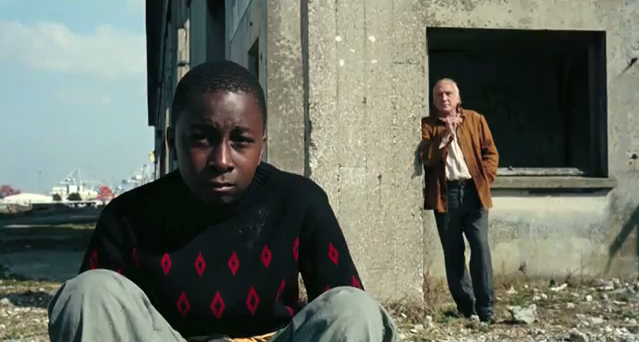Aki Kaurismäki’s Le Havre is a kind of cinematic neighbor to both the Paddington movies and Dreyer’s Ordet.* Kaurismäki sets his story in something akin to our world, which means the possibility–even the likelihood–of a bad ending is always there; disease, loneliness, poverty, old age, persecution, and fear of the law are all part of the texture of the characters’ lives. Since none of them have the advantage of being an adorable talking bear and children’s icon, the movie is presumably not bound to protect them. Anything could happen.
But against this harsh backdrop, Kaurismäki constructs a conscious fairy tale, simultaneously modern and ancient. The film is warm and human, with painterly cinematography, and it has an endearing fondness for its beleaguered and down-at-the-heels characters. It’s a kind of pointillism, a multi-focal rendering of a port city that, thanks to poverty and the police, often feels like it has no exit. It’s gentle and genteel, melancholy but hopeful, a paean to a community coming together and risking itself to help a stranger just because he’s a child and it’s the right thing to do. Something about this should fall through–it should be a case of offering an impossible solution to a real life problem and thus, at the very least, irritating–but Kaurismäki has a delicate touch and a daring approach. The film is always suffused through with enough light and care–it has me wanting to say “naturalistic formalism,” which surely does not exist–to tip its hand to the fact that the story is not being neutrally told. If it’s not going to be cynical and it’s not even going to be neutral, it could fall into a kind of “triumph of the human spirit” cheapness–and it’s really playing with fire by featuring not just an adorable child but an adorable dog. In this case, it’s saved by partly by sheer quality–and sheer ballsiness, which is where the Ordet comparison comes in. Things don’t just luckily or unrealistically work out for young refugee Idrissa (Blondin Miguel) and the impoverished shoe-shiner who helps him (André Wilms). They work out miraculously. The characters are given something outside normal human experience.
In that moment, if the film works for you, it’s transcendent. In Le Havre, the miracle feels like a kind of Platonic upheaval–probably unreachable but well worth yearning for and chasing after. It’s a small-scale story in which few are meaningfully saved, but it feels like a revolution: right, these rules can be broken. There can be something new.
* We at the Solute are not afraid of making bold claims.
Le Havre is available streaming on the Criterion Channel.

